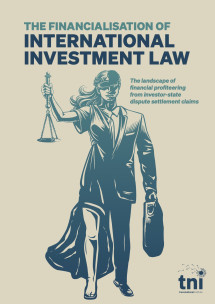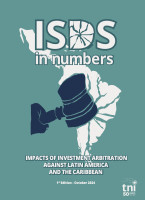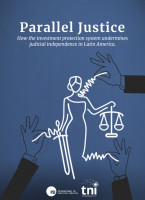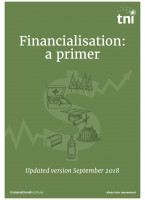The Financialisation of International Investment Law The landscape of financial profiteering from investor-state dispute settlement claims
Temas
A booming financial market has emerged around investor-state dispute settlement (ISDS), where hedge funds and litigation financiers fuel costly legal battles for profit. This report uncovers the key actors, tactics, and consequences of financialising international investment law.

Descargas
Autores
What is the Financialisation of ISDS?
The financialisation of ISDS refers to the growing involvement of financial actors who profit from litigation against states through various mechanisms. We have analysed this trend in three key areas:
- Third-Party Funding (TPF)
- After-the-Event (ATE) Insurance
- Claims Trading
Financial investors in these sectors provide funding or insurance in exchange for a share of the returns from winning claims or portfolios of claims. In claims trading, financial firms buy or broker claims and enforce or resell them on the secondary market. This practice gained momentum after the 2008 financial crisis, as financial actors sought new markets to profit from, with ISDS cases emerging as a prime target.
To dive deeper into how these mechanisms work and the commodification of ISDS claims, refer to Part 3 of the report.
Who Are the Key Players in Litigation Finance?
The ISDS claims market has fuelled the rise of major litigation finance firms, such as Burford Capital, which grew from managing hundreds of millions in assets in 2010 to several billion dollars by 2019. The global litigation finance market is estimated to be worth £70 billion, according to Steven Friel, CEO of Woodsford Litigation Capital, with business continuing to expand, even during the COVID-19 financial downturn. Our report includes detailed insights on these firms and highlights specific ISDS cases they have invested in. For more, see Part 4.
The Role of Lawyers and Arbitrators
The research also uncovers the conflicts of interest between lawyers, financial investors, and arbitrators, particularly the troubling practices of buying elite law firms, hiring arbitrators to select claims for investment, and the issue of ‘double-hatting’ (when arbitrators also act as counsel). These practices have significant implications for the integrity of the arbitration process. For more on this, see Part 5 of the report.
Consequences of the Commodification of ISDS
The financialisation of ISDS has had three major consequences:
- An increase in claims—including frivolous and low-merit cases—that influence negotiations.
- A chilling effect on states' ability to implement environmental and social protections.
- Massive costs for countries involved in ISDS disputes.
Unfortunately, despite efforts to reform ISDS, these practices remain unaddressed. Instead of prohibiting these practices, lobbying efforts have led to them being officially recognised as existing and requiring only limited adjustments.
This report provides an in-depth analysis of the financialisation of ISDS, highlighting its key actors and the profound impact of this expanding market on global investment law. We invite you to explore the full report for a comprehensive examination of these crucial issues




